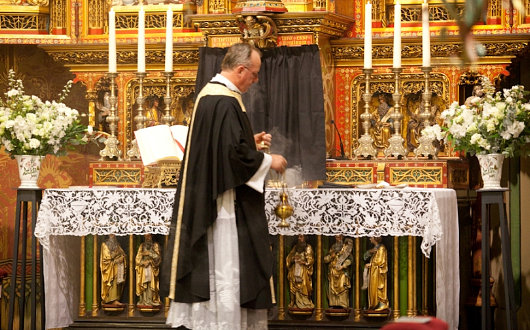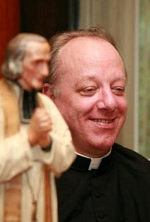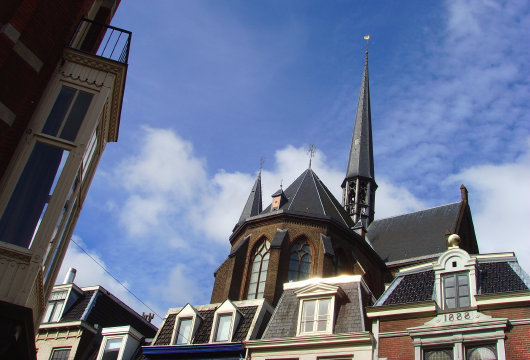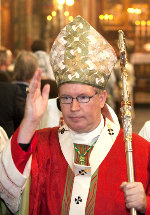The Dutch Church
About Andrew Cusack
 Writer, web designer, etc.; born in New York; educated in Argentina, Scotland, and South Africa; now based in London.
Writer, web designer, etc.; born in New York; educated in Argentina, Scotland, and South Africa; now based in London. read more
News
Blogs
Reviews & Periodicals
Arts & Design
World
France
Mitteleuropa
Knickerbockers
Argentina
The Levant
Africa
Cape of Good Hope
Netherlands
Scandinavia
Québec
India
Muscovy
Germany
Academica
Notes of the Netherlandic Church II
Archbishop Eijk chooses tradition-friendly priest as his cathedral rector


Fr. Harry Van der Vegt
The Archbishop of Utrecht & Primate of the Netherlands, Wim Eijk, has chosen a priest well-known for friendliness to traditional Catholics as the rector of his own cathedral. It was announced recently that Father Harry Van der Vegt is to be appointed rector of the Cathedral Church of St. Catherine in Utrecht, effective January 1, 2010. The priest will also be pastor of the Augustinuskerk and of St. Willibrord’s (which was the subject of the last Dutch church update).
Erik van Goor, of the Dutch periodical Bitterlemon, describes Fr. Van der Vegt as a “quiet but sturdy peasant’s son”. In the face of opposition from Modernist clergy and laity, Fr. Van der Vegt has been known to keep his cool, van Goor says. “Without making a political game of it, without showing any sign of reduced loyalty to the Church as it exists in the Netherlands, he remained quietly loyal to the tradition of the Church.”
“The appointment of Van der Vegt is actually a bit of a surprise”, notes one Dutch blogger, “because Archbishop Eijk is not really known as a major supporter of the old rite.” His Excellency was nonetheless responsible for normalizing the situation of the traditionalists of St. Willibrord’s Church in his diocese, mentioned previously.
Fr. Van der Vegt is currently serving the traditional faithful of Deventer in the province of Overijssel, and his new appointment will likely leave those people without a traditional mass for the time being. However, as Fr. Van der Vegt will be assuming control of St. Willibrord’s, the two FSSP priests currently there will probably be reassigned. The two currently travel all across the Low Countries, offering masses in Amsterdam, Bruges, Rotterdam, and elsewhere.
Parishioners at St. Willibrord’s, meanwhile, hope the new priest will say the extraordinary form at a more advantageous hour; it is currently said each Sunday at 5:30 in the evening.
Foundation ‘Ecclesia Dei’ Delft Releases 2009 Report
The Foundation ‘Ecclesia Dei’ Delft has released its latest report on the state of tradition in the Netherlandic church. ‘Ecclesia Dei’ is a group of Catholic faithful attached to the traditional liturgy as codified in the 1962 missal, and exists for the promotion of Catholic orthodoxy and specifically the liturgical tradition of the Church. In gauging the response to Benedict XVI’s motu proprio Summorum Pontificium, the report finds that “the Dutch Bishops Conference did not define a common policy concerning the implementation of the motu proprio.” The general attitude of the bishops is described as one of extreme passivity, “discouraging requests, ignoring the traditional liturgy, and keeping the faithful in ignorance of the motu proprio by a lack of information combined with disinformation about the traditional Latin liturgy.”
The report posits that bishops are primarily “afraid of the opposition by the modernist-infected priests and/or parish boards.” Many ordinary orthodox Catholics in the Netherlands are disillusioned with the strident Modernism that has infected much of the local church, and the bishops are said to fear “polemics” and “discord” even though, the report states, “they have not undertaken any measures to solve these problems for many years”.
On the teaching of the traditional liturgy in Dutch seminaries, the report confirms that instruction about the extraordinary form is almost nonexistent.
“However, since March 2009 and against the opposition of a number of priestly staff members at the seminary of St. Jan in ‘s-Hertogenbosch, a course about the theology of the traditional Latin liturgy has been given, but only because some of the seminarians claimed to have the right to it and showed a letter from the Pontifical Commission Ecclesia Dei.”
“As a result, 8 of the 12 seminarians now attend a private traditional Latin Mass three days a week at that seminary, despite the opposition.”
“In some diocese the situation has been improved in the first year of the motu proprio only by the initiatives of individual, relatively young priests.”
Some priests have attended German-organised training sessions, while others have received instruction from the FSSP priests in Amsterdam.
“Most of these priests are celebrating the traditional Latin liturgy in private and some even weekly in public now.”
As for the news of the specific dioceses of the Netherlands, much has already been written about the primatial see of Utrecht. In the Diocese of Haarlem-Amsterdam, Bishop Punt is prepared to grant FSSP a personal parish, from which the priests can work all over his diocese. Talks are ongoing. In other dioceses, however, foot-dragging, lip service, or ignorance of requests have been the norm.
Notes of the Netherlandic Church


Willem Jacobus Eijk, Primate of the Netherlands
THE ANCIENT FORM of the Roman rite has returned to weekly use in Utrecht, the primatial see of the Netherlands. Under the guidance of Wim Eijk, Archbishop of Utrecht, the Church of St. Willibrord has introduced a weekly Tridentine liturgy each Sunday at 5:30 pm, to complement the 10:30 am Mass in Latin in the Ordinary Form. (Previously the old rite was offered only once monthly). The Extraordinary Form will be offered by Fr. A. Komorowski & Fr. M. Kromann Knudsen, both of the Priestly Fraternity of Saint Peter (FSSP, or Priesterbroederschap Sint Petrus in Dutch). St. Willibrord’s is a brilliant example of the nineteenth-century revival of gothic architecture, and the concurrent revival of Dutch Catholicism. Yet the parish was also emblematic of the Dutch church’s implosion in the 1960s & 70s. This beautiful, polychromatic monument to God was deconsecrated in 1967, and the diocese planned on demolishing the building. It was later sold, however, and occupied by an Assumptionist priest who continued saying the older form of mass. Joseph Luns, sometime NATO secretary-general and Dutch foreign minister, was a supporter of the apostolate at St. Willibrord’s.
The recently installed archbishop was keen to regularize the former parish’s situation, and erected it as a non-territorial parish under the auspices of the Vereniging voor Latijnse Liturgie (Association for Latin Liturgy) which promotes Latin in both the ordinary & extraordinary forms of the liturgy. The parish newsletter now proclaims that, at St. Willibrord’s, “all masses are once again celebrated ‘ad orientem'”, and both Sunday masses are accompanied by Gregorian chant. The church also revived, starting in 2002, the Procession of the Relics of St. Willibrord, which is held during the annual festival that opens the cultural season in Utrecht, in order to expose the tradition to a wider audience. (more…)
Search
Instagram: @andcusack
Click here for my Instagram photos.Most Recent Posts
- Sag Harbor Cinema March 26, 2025
- Teutonic Takeover March 10, 2025
- Katalin Bánffy-Jelen, R.I.P. March 3, 2025
- Substack Cusackiensis March 3, 2025
- In the Courts of the Lord February 13, 2025
Most Recent Comments
Book Wishlist
Monthly Archives
Categories


